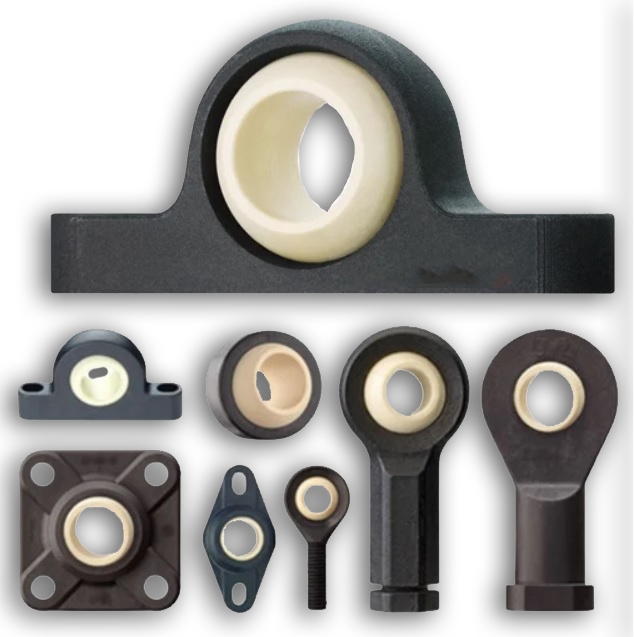BEARINGS

Polymer Bearings
Predictable life cycle.
No lubricants.
Maintenance free
Just install and leave!
- Plain Bearings
- Linear Bearings
- Pillow Block Bearings
- Spherical bearings
- Flange Bearings
- Rod end Bearings
Give us a call to find the perfect solution for your application.
iglidur®
Polymer plain bearings - Economical, lubrication free, maintenance-free, and predictable. A choice of 26 different iglidur® materials for bearings ranging from all-around through FDA-compliant to high-temperature.
igubal®
Maintenance-free and lubrication-free spherical bearings in various designs and configurations. Whether as an upright pivot or flange bearing, igubal® suits all requirements and is more economical and lighter than conventional spherical bearings.
Drylin®
Plastic linear bearing for nearly all types of applications. Whether miniature or self-adjusting whether round or angular Drylin® linear bearings are maintenance-free, lubrication-free, and can often be used as perfect substitutes for conventional, circulating ball bushings and profile guides.
iglidur® - Plain Bearings Made of High-Performance Polymers
Excellent polymers, improved by precise additions of reinforcing materials and lubricants, tested a thousand times and proven a million times.
Each year, igus® engineers develop more than one hundred new plastic compounds and test maintenance-free plain bearings in more than 5,000 experiments per year. That's how in recent years they have built an extensive database of the tribological properties of polymers.
This database makes it possible for us to better assess most of the applications in advance, to calculate the expected service life, and provide our customers with confidence during use.
Fit it and Forget it!
Based on the results of several thousand empirical tests, we are now able to provide you with reliable answers to almost all inquiries about the service life of iglidur® - plain bearings. We can also recommend the most appropriate shaft material using the results from our testing database.
First Class Materials in the Injection Moulding Process
Very few basic materials can be modified and adapted as well as thermoplastics. Thermoplastics can be provided with lubricants, reinforced mechanically by the addition of technical fibres, or varied by additional filling materials, especially with regard to friction and wear behavior.
Plain Bearings - Long Service Life at Low Cost!
igus® develops materials that are well suited to the different requirements of maintenance-free plain bearings:
-
Plain bearings must, at times over many years, receive high loads.
-
Maintenance-free plain bearings should have low coefficients of friction.
-
Their wear resistance should ensure that they can be used for a long time.
Both in material development as well as in the design of bearings, the former disadvantages of plastics can be greatly reduced. Thus iglidur® plain bearings are thin-walled and some materials have especially high thermal conductivity. Both features help to rapidly dissipate heat and thus directly Increase the load capacity of the bearing.
Properties of iglidur® Bearings
Above and beyond the general properties, each iglidur® bearing material has a series of particular properties that create its suitability for certain applications and requirements. You'll find a detailed description of the materials in the following chapters along with a complete list of existing dimensions.
The Self-Lubricating Effect
The high-performance polymers of the iglidur® plain bearing are composed of:
-
base polymer
-
fibres and filling materials
-
solid lubricants
These components are not applied in layers but instead are mixed together homogeneously. The advantage of this design is clear once the requirements of the surface bearing are explained:
-
The coefficient of friction, which is determined especially by the surface of the bearing, should be as small as possible.
-
The surface may not be removed by forces that act on the bearing.
-
The wearing force acts especially on the surface of the bearing, for this, the bearing must be capable of high resistance.
There is no such thing as a single, universal material that performs all of these functions well.
The Traditional Solution is:
Hard shells with soft coating. Each lubricated bearing works according to this principle, and likewise, a number of maintenance-free bearings are equipped with special slide layers. However, this soft slide layer is not strong enough. For high loads, edge pressure, or oscillations, it becomes removed.
iglidur® Plain Bearings Function Differently
One component of the iglidur® materials acts for each function of the bearing:
-
The base polymers are responsible for the resistance to wear
-
Fibres and filling materials reinforce the bearing so that high forces or edge loads are possible
-
Solid lubricants lubricate the bearing independently and prevent friction of the system.
Self-Lubrication
The solid lubricants are, as microscopically small particles, embedded in millions of tiny chambers of the mostly fibre-reinforced material. From those chambers, the plain bearings release tiny amounts of solid lubricants during movement.
The solid lubricants help to lower the coefficient of friction of the iglidur® bearing. Since they are embedded in tiny chambers, they cannot be pressed out. They are always there as soon as the bearing or the shaft is set in motion.
Base Polymers and Technical Fibres
The radial pressure with which the bearings are loaded is received by the polymer base material. In the contact area, this material provides support to the shaft. The polymer base material ensures that the lubricants do not receive a surface pressure that is too high. The base material is also reinforced by technical fibres or filling materials. These additional materials stabilize the bearing especially in cases of continuous load.
The Start-up Phase
In the starting phase, the shaft and the iglidur® plain bearing become mated to one another. During this phase, the surfaces of both materials are adjusted to each other. The specific pressure of the system drops since the contact surfaces of the shaft and bearing expand, during the start-up. At the same time, the rate of wear decreases and approaches a linear curve. In this phase, the coefficients of friction are changing until finally reaching a value that to a large extent is constant.


